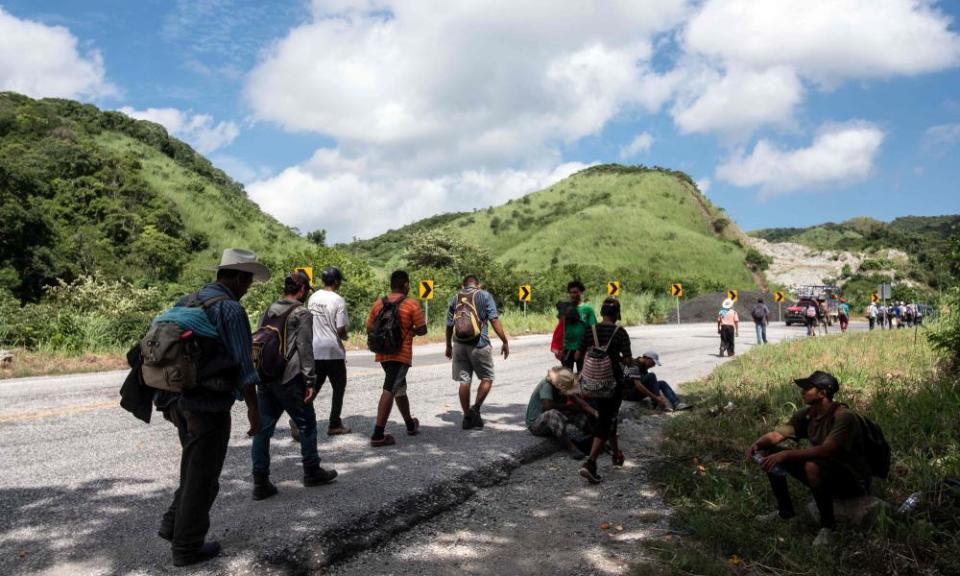'Cities of tents': Trump heightens anti-immigrant rhetoric at White House
Speech billed as policy address offers few specifics as president pledges to indefinitely detain migrants
Donald Trump has stepped up his rhetorical attack over immigration before next week’s midterm elections, using a White House address on Thursday to float what is possibly an unconstitutional clampdown on asylum seekers – and hinted that even people throwing stones near the US border could be targeted with military firepower.
In a session lasting almost an hour in the Roosevelt Room, Trump talked tough on immigration but failed to deliver much in the way of specifics. White House aides had previously billed the even, inaccurately as a policy announcement.
In lurid language that resembled one of his rally speeches more than a presidential address, he vowed to prevent the “violent” Central American migrant caravan heading to the southern border from “invading” the country. He said a comprehensive executive order would be released next week, though it was not clear what it would contain.
Instead, he made vague pledges that thousands would be held indefinitely in “massive cities of tents” apparently now being built at the border with military assistance. He also implied that in future asylum seekers would only be able to petition the US for safe haven by approaching designated border posts.
In echoes of his divisive rally speeches this election cycle, he pledged to detain those crossing the border unlawfully, rather than using the system known by the stark term “catch and release”, where migrants are released into the community after apprehension, pending their court case.
“We are not releasing any more. Big change, as of a couple of days ago … we are going to catch but we are not going to release, they are going to stay with us until the hearing takes place,” he said.
His most inflammatory remarks concerned the actions of US troops at the border, with 5,200 already deployed and possibly 10,000 more to follow. Trump was asked whether they might fire on migrants, and he replied: “I hope not.”
Then he added: “Anybody throwing stones, rocks … we will consider that a firearm because there’s not much difference when you get hit in the face with a rock.”
There were some clashes between Mexican police in riot gear and migrants in the caravan as they pushed their way over the border with Guatemala last month. The caravan is still more than 800 miles from the US border.
It is not clear whether the US president has the authority to order troops to respond to stone-throwing with live ammunition through an executive order. But Trump returned to the theme on Thursday night at his latest campaign rally in Columbia, Missouri.
He said to his followers in an air hangar at Columbia airport: “Did you see what they did to the Mexican police and military in breaking through the border? These are tough people, they are not little angels and we are not letting them into our country.”
Trump’s remarks suggest has decided to put most of his political eggs into the anti-immigrant basket. His White House comments came a day after he posted a new national political advertisement that attacked the Democrats in starkly racial terms.

Produced on behalf of the Trump campaign, the ad showed court footage of Luis Bracamontes, who was convicted of killing two California police officers, having re-entered the US illegally following deportation. “Democrats let him into our country. Democrats let him stay,” the caption said.
Politifact reported that both statements about the Democrats were untrue.
Trump claimed at the White House that his administration had begun building a wall to secure the southern border with Mexico, when in fact investment has so far only gone into non-wall infrastructure. He also repeated a conspiracy theory that he has begun disseminating at campaign stops, that the caravans of Central American asylum-seekers were paid for by leftwing donors.
He did not on this occasion mention the billionaire liberal donor George Soros, but he did say “there seems to be a lot of money passing” and that there was a “lot of professionalism involved”.
Trump returned to the Soros conspiracy theory a second time at the Columbia, Missouri, rally. He told the crowd: “Does anybody think that it’s just by accident that the caravans are forming? I really think that somebody not on our side of the ledger was involved.”
But his worst inaccuracy of his White House speech was that the number of undocumented immigrants in the US could be as high as 20 million. His own administration puts it at 12 million.
Any executive order is certain to face numerous legal challenges through federal courts. Measures to ban travel into the US from Muslim-majority countries were similarly snarled up in the courts until the supreme court approved them in June.
The president will find it difficult to use his presidential powers to overturn legislation from Congress. Under the Immigration and Nationality Act, anyone entering the US as an immigrant can apply for asylum, whether or not they did so at a designated port of entry.
The vitriolic rhetoric on immigration amounts to a huge gamble on Trump’s part that fear of an “invasion” of migrants fleeing violence, extortion and poverty in their home countries will be the factor that drives his conservative base to the polls.
In recent days he has ordered troops to the US border and promised to scrap the right to US citizenship for those born in the country.
But such a highly contentious strategy also carries potentially grave political risks. The latest polling suggests that the Democrats are well placed to take back the House of Representatives on Tuesday.

